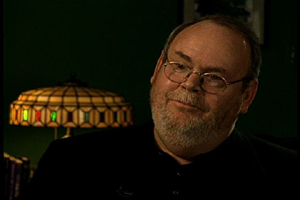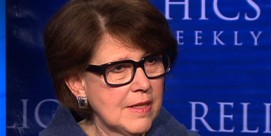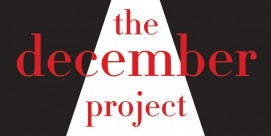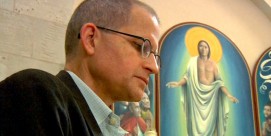In This Episode << SLIDE LEFT TO SEE ADDITIONAL SEGMENTS
Thomas Lynch Extended Interview
Read more of Bob Abernethy’s interview with author and funeral director
Thomas Lynch, followed by an excerpt from his book THE UNDERTAKING: LIFE
STUDIES FROM THE DISMAL TRADE:
 BOB ABERNETHY: You have called undertaking “the dismal trade.” Is it?
BOB ABERNETHY: You have called undertaking “the dismal trade.” Is it?
THOMAS LYNCH: The etymology of the word “dismal” — the bad day, the dark day, the unlucky time — is exactly what most people feel when a death occurs in the family. So, because it is directly related to a death in the family, it is the dismal trade. But that doesn’t mean that it’s a morbid trade. When I see people at this most difficult time in their family history, I’m also seeing what’s best about our species — the attachments and the affection and the faith.
ABERNETHY: There is occasional need for the funeral director, for all that you do. At the same time, there is a discomfort, a wanting to keep one’s distance from the whole business.
LYNCH: There is this huge ambivalence, exactly as you say. People need us, but they don’t necessarily want to need us. The tuition is a high one. It’s a little bit, I suppose, like the oncologist; or the lawyer when you’re in trouble; or the clergy when you’re vexed by your conscience. You need them, but you don’t want to need them. In one sense, people are grateful to us. But they’re not grateful for the circumstance that brings them to us.
ABERNETHY: Is it lonely work?
LYNCH: Not at all. That’s part of the great satisfaction — that you are dealing with people all the time. People will say to me, “How can you stand to be around all those dead bodies?” Well, I keep telling them that for every dead guy, there are 150 or 200 people to whom that death matters. We have the dead outnumbered at funerals, and it is the living that we spend our time with and among. And there are a lot of satisfactions in that.
ABERNETHY: Is it depressing?
LYNCH: No. There are times when you oughtn’t to be doing it. There are times when it can be overwhelming. And like every other professional, you need to know when that happens to absent yourself — to repair yourself.
ABERNETHY: What is it that becomes overwhelming?
LYNCH: I think, in a very real sense, grief is the tax we pay on loving people. And you see abject, acute grief a lot. You are constantly presented with questions for which there are no answers; the best you can hope to provide is a venue in which they can utter the questions without fear and shame. It’s like constantly being in the Book of Job.
ABERNETHY: Questions like “Why me?” or “Why this?” or “Why this now?”
LYNCH: Exactly. That attends every death, whether the death is objectively tragic or personally tragic. The woman who dies at 100 is not old enough, for her son and daughter, to die. Every death troubles.
ABERNETHY: How does being a funeral director over the years shape you? How does it affect your view of life?
LYNCH: I suppose it makes me think it’s very precious, because I see how much of a difference people make to one another. I think my father and my mother had this feeling — more so my father, because he was at this day after day. He really was concerned that God might take a day off on occasion. You get to worry about your children’s well-being, because you see bad things happen to children. Life changes too fast. You know, there is no rhyme or reason to the deaths that happen, and, in some ways, that makes life scary. In other ways, it makes it very precious. And I think the only antidote to that particular fear is — faith.
ABERNETHY: You realize life is short, and so you don’t go around holding grudges, or being angry for a long time, or what?
LYNCH: You try to settle those scores sooner. We’ve buried men and women who left mad at their spouse, or mad at their teenager, and didn’t come home to say, “I’m sorry,” or “I’m kidding.” We see the baggage left afterwards. So, yes, I don’t hold grudges very long.
ABERNETHY: What are the meanings for you of the title of your first book of essays, THE UNDERTAKING?
LYNCH: As a child, I always thought that it meant my dad took them under. But later, I came to understand that to undertake something is to promise, to say you will take care of that. It’s a pledge to see things done. The Victorian British station of the undertaker was someone who undertook the responsibilities to care for the living by taking care of the dead. This is exactly what I see as our role. We serve the living by caring for the dead. We measure how well we do each.
ABERNETHY: What’s the hardest part for you? Is it the death of a child?
LYNCH: The death of a child really calls our faith into question. As a younger person, I used to often shake my fist in God’s face when there was a death of a child and say, you know, “What’d you have in mind here, God?” I think the shaking of the fist is probably something that most parents do when this happens. I don’t want to know how that feels. I’ve said that to parents who have buried their children: “I don’t know how you feel, and I don’t want to know how you feel.” And I don’t.
ABERNETHY: When someone comes to you in terrible grief and says, “Why did this happen to him or her now, what do you tell them?
LYNCH: I don’t have an answer for that. There are provisional answers. If you are the doctor, you say it was an acute myocardial infarction. But, of course, the doctor regards somebody’s heart disease in scientific terms; whereas, in human terms that might mean that you can’t lift your grandchild, or you can’t walk up and down the stairs, or you can’t leave the house. So, in many ways, I see a death in the family not solely or simply as a medical event. I often tell doctors to try to think beyond the medicine of it. And I often tell clergy to try to think beyond the religious or spiritual event that has taken place.
ABERNETHY: But what do you tell the person who lives and who loves that person who died?
LYNCH: You tell them, “I can’t fix this, but I can be with you through this.” When most people ask that question, they are not asking for an answer. They want to be able to voice the question out loud, without shame and without guilt and without someone saying, “Well, here’s why … ” They’re not looking for the answer. They’re simply looking for a space in which to either shout, or whisper, or sing that question. The question’s there, for sure: “Why me?” Why not?
ABERNETHY: How has being a funeral director for these years affected your own religious views, if at all?
LYNCH: It’s given me a heavy reliance on faith, and a greater appreciation for the language that our religions bring to this human predicament of a death in the family. I don’t know how people would do it without faith. We can get through the baptisms and weddings pretty easily. That’s a cakewalk compared to a death in the family. But a death in the family really grabs us by the throat and says, “What do you have faith in?” or “Do you have faith? And, if so, in what?” Not only my work as a funeral director, but also the deaths of my parents and friends and people I care about have made me more reliant on faith.
ABERNETHY: For some people, a death that’s particularly tragic and painful can shatter faith.
LYNCH: It can go that way. It’s like in the Book of Job, when Job keeps saying, “Well, I’ve done what I was told to do. What’s going wrong here? I’m losing everything.” And God comes to him at some point and says, “Must I be wrong for you to be right? Are you accusing me? I’m the one that speaks with thunder, not you.” It’s quite all right as an act of faith to voice doubt, and to voice wonder, and to question God. I see those as articles of faith. I see people’s anger and despair and hurt and wonder as part of the same pilgrimage to understand God’s purpose and will.
ABERNETHY: How do you define your outlook on life? After all this dealing with death, after all you’ve seen, how do you see the world?
LYNCH: Well, I’m glad to be alive. You know, every day you wake up is a bonus. I do think that. I’m glad for the wellbeing of my family. I feel blessed. Which is not to say that I’m not like the next guy — full of doubt and wonder and worry sometimes. But the older I get, the list of things that I have to worry about is getting shorter and shorter. And if I just turn those things over to God (whoever God is these days, and she or he changes a lot for me from day to day), God seems to be taking care of them.
ABERNETHY: You have written and spoken a lot about the importance of the funeral, about what it does for people — that ceremony. Talk a little bit about that.
LYNCH: A funeral is the way we get through a death in the family. It has not changed fundamentally since the species began doing it 40,000 years ago. The fashions have changed, but the fundamental obligation of a funeral is to bear witness to a death in the family and to initiate remembrance — that’s pretty much the same. In some cultures they do that with fire, and other places with graves. Some places use caskets. Some places use old doors. Some people leave their dead on the tops of mountains to be eaten by scavenger birds. Some people put them in vaults in veterans’ cemeteries. Those are fashions. But the fundamental obligation of a funeral is to provide an opportunity for the living to confront their dead and to dispose of them in a way that’s other than the way we dispose of a rock or a rhododendron — that’s not changed. They have value in that respect.
ABERNETHY: And somehow, you’ve written, the funeral conveys or celebrates the meaning of someone’s life.
LYNCH: The funerals in my own family — the doing of them, just the large-muscled involvement in them — did give us a chance to say what happened, and to whom, and how it is, and how we’re going to manage. Think of the people who must be there to get a funeral going: You have to have someone who agrees to quit breathing — forever, and then you have to have someone to whom that death matters, and then you have to have someone who tries to make some sense of it. This doesn’t seem to change. We have the dead guy, and we have the people to whom the death matters, and someone — shaman, rabbi, priest, a holy one, a witch, whatever it happens to be — comes in and says, “This is what happened, and this is why.”
ABERNETHY: What do you think is going on with America’s attitudes toward the formality of the funeral? Are we beginning to ignore funerals or trivialize them?
LYNCH: The fashions are constantly in flux, but I do think that we are returning to a time when people see their obligations to take part in these things in a way that for three or four decades we were trying to get away from. Through the ’70s and ’80s, people were getting comfortable with “disappearing” their dead and then having a memorial service or a gathering afterwards — weeks, months, years afterwards — to talk about it. This follows the same sort of progress with other things — with birth and sickness and age. We have, in some ways, the women of the baby-boom generation to thank for the hospice movement. They refused to see their parents die surrounded by the machinery of intensive care and said that they would, as an alternative, bring their people home to care for them, where they could really take care of them. Even though the medicine had to be downsized, humanity was upsized in that transaction — and I think all to the good. In the same way, men of my generation absolutely refused — for reasons that I’m not entirely sure of — to sit out in the waiting room with a handful of cigars, waiting to be declared a parent by some health care professional. They wanted to be there. They wanted to witness it. They weren’t of much use, apparently. All they said was, “Breathe, honey. Breathe.” But being there was important. And in the same way, funerals are more a matter of presence and attendance and witness than they were, say, 20 years ago.
ABERNETHY: People are more serious about the role of the funeral now?
LYNCH: They are more serious about their own obligations to tend to these things. Anybody can get on their cell phone and get out their gold card and have their dead parent or grandparent “disappeared” from the face of the earth by someone like me. We can handle that. We don’t have to deal with these things. But, more and more, people are identifying a death in the family as a time when the object is not to get around it, but to get through it. And so they are, in a sense, reinventing funerals. They are reinventing liturgies and ceremonies and metaphors and symbols that speak in a new generation’s language to this old, human predicament; because this is the signature of our species. We die. We don’t all pay taxes. We won’t all sleep with another member of our species. But we will all die. The numbers are convincing on this, you know. One hundred percent. They hover there — all the time.
ABERNETHY: You’ve spoken about the need to take death seriously as a sign of taking life seriously — about a relationship there between those two.
LYNCH: We must live in relation to our mortality. That relationship is ours to define. But we all know people who live as if they’re never going to die. We may call them daredevils. And we know people who live as if they’re going to be dead tomorrow. They might be hypochondriacs. But between those two extremes there are most of us, who walk around feeling that kernel of our mortality in us. We know it’s there, and we see it in the little losses of our lives every day, when we look in the mirror and find ourselves grayer, or balder, or blinder, or full of more aches and pains. That is our mortality beckoning from inside of us. We may take that seriously on some days, and we may let it pass on others. But I do think that living as if you’re going to die does bring a certain meaning to life.
ABERNETHY: Meanwhile, for some time there has been a movement to spare one’s survivors all the hard decisions about what to do with me after I’ve died — to preplan and prepay one’s funeral. What do you make of that?
LYNCH: The instinct to preplan has been around for a long time. We like to do that with big life events: birth, death, and marriage. Ever since the pyramids, we’ve been preplanning things. The pharaoh noticed it could happen to him, and we’ve been, in a sense, pre-funding funerals since we stuffed money in a mattress. Pirates used to have gold earrings to pay for their return if they should die on ship. But the preselling of funerals is a different thing, and that’s based on a hopeful idea that if you’ve got it paid for, you’ve got it taken care of. And it’s just not so. Even the planning doesn’t take care of it any more than Planned Parenthood has made for better parents or prenuptial agreements have made for better marriages. Preplanned funerals haven’t made for better funerals; it’s just better planned funerals. And certainly the preselling of funerals (as is practiced not by the people who call you in the middle of the night, but by the people who call you in the middle of your dinner) is just abusive, as far as I’m concerned. It makes no particular sense.
ABERNETHY: But you have also written with strong language about the importance of letting your survivors, your family make the sometimes hard decisions about how the funeral should be arranged, how it should be conducted, what should be done. This is what you want for yourself.
LYNCH: It is the heirs to do. You’re leaving them everything. Why wouldn’t you leave the decisions that they have to live with? Someone asked me last week, “Do you trust your children to make the right decisions about your funeral?” And the answer is, “Well, if they make the wrong decisions, I trained them, and I’ll get what I deserve.” So, yes, of course I do. And whatever decisions they make, they live with, I don’t. I’m convinced that the dead don’t care about these things. And they don’t, at least from my experience. I’ve never had someone dead say to me, “I’d rather the blue suit, or I prefer that mahogany casket.” They never do. Because our survivors have to live with decisions, they ought to have a hand in making them. The discussion between parent and child, between husband and wife, between partner and partner about these things should be ongoing. But to hold someone to a particular task — it’s very narcissistic: “Here’s what I want done with me when I’m dead.” It’s the mortuary equivalent of “have it your way.”
ABERNETHY: But why wouldn’t it be a kindness to your heirs to tell them in advance, “This is what I’d like,” and then they know what you’d like and feel more comfortable with it?
LYNCH: I think I do tell. I think it is my job to convey my values to my heirs. But I don’t have to arrange things down to the doilies. The best example of this I ever got was a letter: I was a young funeral director, and a man brought in a letter that his father had left for him. It spelled out the things that were important to him — that he thought were valuable for a funeral. He said, “I’ve always thought this hymn spoke directly to the hearts of people,” and he listed the hymn. And he said, “I’ve always thought this verse had meaning,” and “I’ve always thought this was important and that was important. And I’d like to be buried next to your mother.” And on and on he went in this letter. And at the bottom of the letter was a paragraph that I always thought of as a kind of coupon. It was a disclaimer, and it said, “I’ve felt, furthermore, that all this is done for the living. So do whatever you want. It won’t bother me one bit.” So he had done both things. He had communicated his values without giving someone hoops to jump through.
ABERNETHY: Is an open casket important?
LYNCH: I don’t think it has much to do with the casket. I do think it’s important that the living see the dead. That’s part of the witness of it. That’s part of the “This is why it hurts. That’s what’s happened.” I do think the presence of the dead at their funeral is very much like the presence of the baby at a baptism, or the bride and groom at a wedding. They are the focal point. It is the reason we gather. And so to invite everybody but the dead guy makes no particular sense to me. My grandmother used to insist, “When I’m dead, I want a closed casket.” But I explained to her that when she was dead it would be her children and grandchildren who needed to come face to face with that reality. And I’ve got to tell you, after years and years of sitting and standing with families who have waited for their dead to be returned from wars, or tragedies that happened far from home, or disasters that always turn up in the news, I know that finding what was lost is really important. It’s essential. It’s fundamental. It’s not about whether the casket’s open or closed. It’s whether or not the living can conquer death.
ABERNETHY: More and more people say that they want to be cremated rather than buried. How do you feel about that?
LYNCH: Cremation is an ancient and honorable way of disposing of our dead. And it works. It does what it’s supposed to do. It disposes of them with honor, and the problem I have with it is the way we practice it in this culture. We do it devoid of all its ceremonial value. We do not see it. People typically go to a cemetery and see the grave and watch the casket lowered into the grave. But they do not go to the crematory and see the body burned. In East India, where 99 percent of the dead are burned in public crematories, the family builds the pyre. The flame is brought from the home fire to ignite the fire. People sing and pray and watch. And the cremation has so much more meaning. But in our Western culture, where we have devalued fire — not least because we were all told that when we’re in trouble with God, we go to Hell, where we burn — we see fire as wasteful and punitive. And because of that, we tend to see cremation in our culture as more functional than ceremonial.
ABERNETHY: Do you encourage people who choose cremation to stay and watch?
LYNCH: I certainly make available to them that option. Few take it. I think that’ll change, though. More and more people will do that. Again, this is partly fashion. I do ask people, when they talk about cremation, to think of what is happening. Too often we’re busy talking about the urns and not about what burning represents. When a family says to me, “We want to have a cremation,” I want to discuss what that means to them, because for many families it’s the first one. Fire is either punitive and wasteful, or it is purifying, releasing, reuniting. It has either positive values or negative values. I just want a family to identify which values they are.
ABERNETHY: People see the body before them and sometimes say, as a means of comforting somebody who’s bereaved, “What you see is just a shell.”
LYNCH: Well, in some ways it is a shell, but it’s the “just a” part that I have a problem with. The emphasis there is not on what the body may or may not be. The emphasis, when you say it’s “just a shell,” is on the minimalization, as if it oughtn’t to hurt, because it’s “just a shell.” It is the one and only shell most of us get. It is the one and only shell that we rush to the hospital, that we’ve had coffee with for 40 years; it is the shell that put us through college. It is the one and only body of the one we love. But this returns to your question about cremation. In the West, they don’t say, “Please cremate.” They say, “Just cremate.” “When I’m dead, just cremate me.” The emphasis is not on the value of the fire; it is on the value of minimizing what’s happened: “Spare me the bother. Cremate.” Whereas I think cremation should be a positive, liturgically rich event.
ABERNETHY: You’ve gotten some notice recently for your views about watching an execution, especially Tim McVeigh’s. Why do you think that’s important?
LYNCH: It’s important to me because it’s the first time in 40 years that the federal government, to whom I pledge allegiance and pay taxes, is going to execute another of my species in my name. So in my adult life, this is the first one about which I have an opinion. And if I think of the reasons why we execute, why we argue in favor of capital punishment, I don’t have a clue about the rightness or wrongness of it. I wonder about those things. If it’s deterrence, if it’s justice, if it’s revenge, I want to watch — whichever of those things [it is], or maybe it’s all of those. And if it’s none of those, I want to know that, too; because if it’s none of those, why should we bother doing it? I just feel it’s my obligation. At the very least, it should be my option. But I’m being told by the government that intends to kill him for me, for us, that I can’t watch because we’re afraid of the spectacle. It was a spectacular terrorism that he did in Oklahoma. And he did it to all of us. There were 168 people who died there. And we went in search of all their bodies, to find them, to return them to their people; because we knew for those people that seeing is believing. It’s no different when they kill Tim McVeigh. Seeing is believing. We wouldn’t send our soldiers off to war with no cameras to keep an eye on what they’re doing.
ABERNETHY: Your one-time neighbor in Michigan was Dr. Kevorkian, before he went off to prison. What do you make of assisted suicide? If somebody is in pain and using up all his money and has lost control of life and wants terribly to die, shouldn’t that person have a right to be helped?
LYNCH: Well, they should have the right to help. But do they have the right to assistance in their suicide? To me, “assisted suicide” sounds oxymoronic — like “holy war.” Suicide means “one” homicide. Sui generis — one of a kind. One person doing the homicide. When there are two people in the room, there is a relationship. Because we have the ability to make things dead does not mean that we have the right to make things dead. If the only way to get rid of suffering is to get rid of the sufferer, then I say we haven’t looked at our other options. Do I think that palliative care needs to be addressed in a new way? Yes, I do. Do I think that people can be medicated for their pain in a way that might hasten their death? Yes, I do. But I see Jack Kevorkian as a serial killer. I see him as the back alley and the coat hanger of this particular existential question. We were talking about witness. Most of us here in Oakland County, Michigan sat around and discussed these issues about assisted suicide and death with dignity and our right to die in the way we’d be discussing whitewall tires or rear-window defrost. It was all speculation. But when we saw it happen, when we saw him put down one of our own kind Sunday night in prime time — in the way that, by the way, we intend to put down Tim McVeigh — we said, “No, that’s not mercy. That’s wrong.” And that’s why Dr. Kevorkian is in the prison now in Jackson, Michigan.
ABERNETHY: In AN AMERICAN WAY OF DEATH, Jessica Mitford made accusations of terrible greed and exploitation in the funeral industry. Was that true at the time? Has it changed since then? Was it not true then? What’s the situation now, compared to then?
LYNCH: There are abuses in every line of work, so to say that Jessica Mitford’s book was not true would not be true. I just think the title was off. To me, it was about The American Math of Caskets, not the American way of death. To say that the marketplace in anything — whether it’s funerals or Buicks — can range from professionals to scammers and schemers is not news. Though it was news in 1963, when she wrote that book. And it was the same year that we had what is arguably one of the most important funerals in our nation’s history, when Kennedy was shot. If we’d have done it her way, I think, it would have been a sadness not to have had that funeral. The images we still have of John Kennedy’s funeral and burial are important images for a number of generations. What always bothered me about Jessica Mitford’s book is that it never talked about the deaths in her own family. Here was a woman who wrote two books called AN AMERICAN WAY OF DEATH (she revisited the title in 1998). Her first husband died, tragically, in the war. He was shot down over the English Channel, and his body was never found. Her first daughter died in a South London hospital of a fever at four months of age. Her first son was killed when his bike was hit by a bus in Berkeley, California. He was ten years old. And she never wrote a paragraph, not a sentence, about them. She never named them. For her, the math was easier than the meaning of these things.
Excerpt from THE UNDERTAKING: LIFE STUDIES FROM THE DISMAL TRADE by
Thomas Lynch:
I want a mess made in the snow so that the earth looks wounded, forced open, an unwilling participant. Forego the tent. Stand openly to the weather. Get the larger equipment out of sight. It’s a distraction. But have the sexton, all dirt and indifference, remain at hand. He and the hearse driver can talk of poker, or trade jokes in whispers and straight face while the clergy tender final commendations. Those who lean on shovels and fill holes, like those who lean on custom and old prayers, are, each of them, expert in the one field.
And you should see it till the very end. Avoid the temptation of tidy leave-taking in a room, a cemetery chapel, the foot of an altar. None of that. Don’t dodge it because of the weather. We’ve fished and watched football in worse conditions. It won’t take long. Go to the hole in the ground. Stand over it. Look into it. Wonder. And be cold. But stay until it’s over. Until it is done.
On the subject of pallbearers — my darling sons, my fierce daughter, my grandsons and granddaughters, if I’ve any. The larger muscles should be involved. The ones we use for the real burdens. If men and their muscles are better at lifting, women and theirs are better at bearing. This is a job for which both may be needed. So work together. It will lighten the load.
Look to my beloved for the best example. She has a mighty heart, a rich internal life, and powerful medicines.
After the words are finished, lower it. Leave the ropes. Toss the gray gloves in on top. Push the dirt in and be done. Watch each other’s ankles stamp their feet in the cold, let your heads sink between your shoulders, keep looking down. That’s where what is happening is happening And when you’re done, look up and leave. But not until you’re done.
So, if you opt for burning, stand and watch. If you cannot watch it, perhaps you should reconsider. Stand in earshot of the sizzle and the pop. Try to get a whiff of the goings on. Warm your hands to the fire. This might be a good time for a song. Bury the ashes, the cinders, and bones. The bits of the box that will not burn.
Put them in something.
Mark the spot.
Feed the hungry. It’s good for them. Feed them well. This business works up an appetite, like going to the seaside, walking the coast road. After that, be sober.







